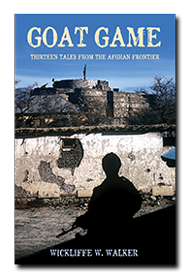Goat Game: Thirteen Tales from the Afghan Frontier
Goat Game: Thirteen Tales from the Afghan Frontier, stands apart from the volumes of material now being published about the conflicts in Afghanistan and Pakistan. Lieutenant Colonel Wickliffe "Wick" Walker (U.S. Army, retired) is a gifted writer, with extraordinary depth and experience to reflect upon the culture of this distant land. The related vignettes he develops in Goat Game are carefully constructed to provide insights into two decades of history in a complex and contradictory milieu that defies facile explanations. By writing fiction, Wick has more freedom to explore very real problems that have had deadly consequences, as in the tale of "This Troublesome Priest" about a tolerant Islamic mullah opposed to the radicals. Likewise, his descriptions of ways to avoid inviting an attack in a lawless area reflect the wisdom of more than forty years of hard-won experience. In my mind, Wick is a latter day Rudyard Kipling who uses fictional tales to conjure up evocative images of a landscape most readers will never visit. This enjoyable literary experience is based on sharp observations of sometimes harsh social realities, furthering an understanding of how people on the Afghan frontier live their lives.
Goat Game's clean but vivid prose succeeds very well in transporting readers to this exotic place and introducing them to an extremely interesting set of believable characters who act according to a profoundly different world view and set of values. At the same time, Wick makes observations about the human condition that transcend culture and exotic locales. In the tradition of the soldier-scholar who seeks to understand both allies and enemies, as well as the great majority of local people who do not want to commit to either side, Wick does not intend to draw clear-cut "lessons learned," in Goat Game. It is about nuances and subtlety, qualities foreigners are often accused of lacking in dealing with frontier tribesmen. This book should attract a broad spectrum of readers, from those who have served in Afghanistan and Pakistan to the general public interested in being exposed to the culture of that region.

